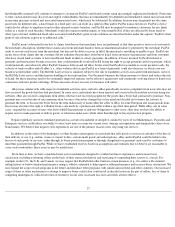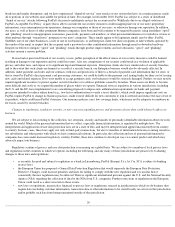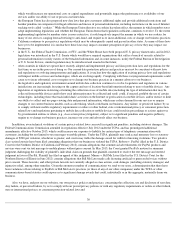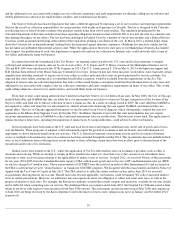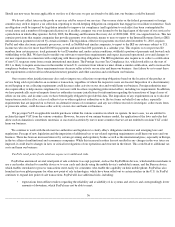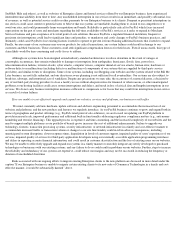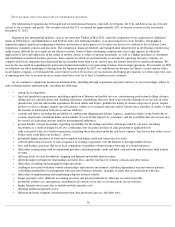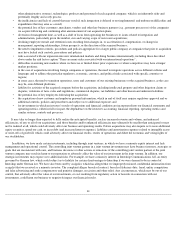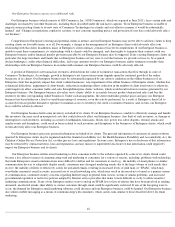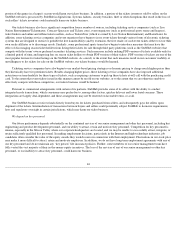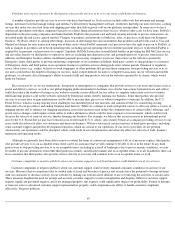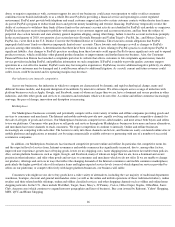eBay 2013 Annual Report Download - page 38
Download and view the complete annual report
Please find page 38 of the 2013 eBay annual report below. You can navigate through the pages in the report by either clicking on the pages listed below, or by using the keyword search tool below to find specific information within the annual report.
Should any new taxes become applicable to our fees or if the taxes we pay are found to be deficient, our business could be harmed.
We do not collect taxes on the goods or services sold by users of our services. One or more states or the federal government or foreign
countries may seek to impose a tax collection, reporting or record-keeping obligation on companies that engage in or facilitate ecommerce. Such
an obligation could be imposed by legislation intended to improve tax compliance (and legislation to such effect has been contemplated by
several states and a number of foreign jurisdictions) or if an eBay company was ever deemed to be the legal agent of the users of our services by
a jurisdiction in which eBay operates. In July 2008, the Housing and Economic Recovery Act of 2008 (H.R. 3221) was signed into law. This law
contains provisions that require companies that provide payments over electronic means to users to report to the Internal Revenue Service (IRS)
information on payments received by certain customers. The legislation, effective for payments received after December 31, 2010, requires
PayPal and other electronic payments processors, as well as StubHub and similar companies, to report to the IRS on customers subject to U.S.
income tax who receive more than $20,000 in payments and more than 200 payments in a calendar year. This requires us to request tax ID
numbers from certain payees, track payments by tax ID number and, under certain conditions, withhold a portion of payments and forward such
withholding to the IRS. We have had to modify our software to meet these requirements and expect increased operational costs and changes to
our user experience in connection with complying with these reporting obligations. The IRS regulations also require us to collect a certification
of non-U.S. taxpayer status from certain international merchants. The Foreign Account Tax Compliance Act, which took effect at the start of
2013, is likely to require an increase in the number of non-U.S. customers from whom we must obtain a similar certification, and to increase the
compliance burdens on us. These requirements may decrease seller activity on our sites and harm our business. Any failure by us to meet these
new requirements could result in substantial monetary penalties and other sanctions and could harm our business.
One or more other jurisdictions may also seek to impose tax collection or reporting obligations based on the location of the product or
service being sold or provided in an ecommerce transaction, regardless of where the respective users are located. Imposition of a discriminatory
record keeping or tax collecting requirement could decrease seller activity on our sites and would harm our business. Foreign authorities may
also require eBay to help ensure compliance by our users with local laws regulating professional sellers, including tax requirements. In addition,
we have periodically received requests from tax authorities in many jurisdictions for information regarding the transactions of large classes of
sellers on our sites, and in some cases we have been legally obligated to provide this data. The imposition of any requirements on us to disclose
transaction records for all or a class of sellers to tax or other regulatory authorities or to file tax forms on behalf of any sellers, especially
requirements that are imposed on us but not on alternative means of ecommerce, and any use of those records to investigate, collect taxes from,
or prosecute sellers, could decrease seller activity on our sites and harm our business.
We pay input VAT on applicable taxable purchases within the various countries in which we operate. In most cases, we are entitled to
reclaim this input VAT from the various countries. However, because of our unique business model, the application of the laws and rules that
allow such reclamation is sometimes uncertain. A successful assertion by one or more countries that we are not entitled to reclaim VAT could
harm our business.
We continue to work with the relevant tax authorities and legislators to clarify eBay's obligations under new and emerging laws and
regulations. Passage of new legislation and the imposition of additional tax or tax-related reporting requirements could harm our users and our
business. There has been an increased interest by certain governing and regulatory bodies as well as the international press, especially in Europe,
in the tax affairs of multinational and ecommerce companies. While this increased scrutiny has not resulted in any changes in the way taxes are
imposed, it could lead to changes in laws or critical investigations of our operations and structure in the future. This could lead to additional tax
costs and harm our business.
PayPal's retail point of sale solutions expose us to additional risks.
PayPal has announced several retail point of sale solutions to accept payment, such as the PayPal Here devices, which enables merchants to
use a card reader attached to a mobile device or to scan cards and checks using the mobile device's embedded camera, and the Beacon device,
which enables merchants to process transactions more easily for consumers who enable the capability on their mobile phone. PayPal has also
launched in-store pilot programs for other new point of sale technologies, which have been rolled out to certain retailers in the U.S. As PayPal
continues to expand into point of sale transactions, PayPal will face additional risks, including:
36
• expectations from offline retailers regarding the reliability and availability of its systems and services and correspondingly lower
amounts of downtime, which PayPal may not be able to meet;



